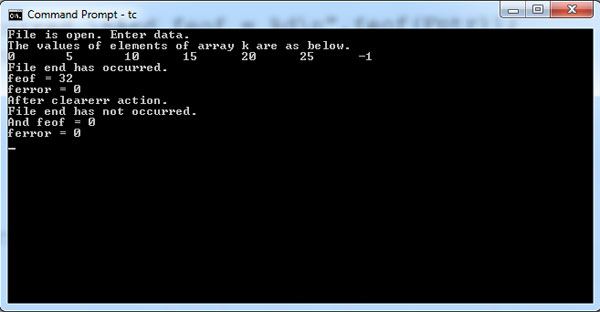Function clearerr ()
The function prototype is as given below.
void(clearerr(FILE* Stream);
The function clears the end of file and error indicator for the argument stream
Function feof ()
The function prototype for this function is written in the following manner:
int feof(FILE*Stream);
The function finds if the EOF indicator is set for the stream pointed to by the argument. If so, it returns a non-zero value.
Function ferror ()
The function prototype is written as shown below.
int ferror(FILE*stream);
The function finds the status of error indicator with the stream. The function returns zero if there is no error, otherwise returns a non-zero value. The function perror () may be used to find the type of the error.
Function perror ()
The function prototype is written as given below.
void perror(const char* str);
The function displays a string giving error message as predefined in compiler for a particular error condition.
Illustrates functions feof (), clearerr (),and ferror ()
#include <stdio.h> #include <stdlib.h> // for exit function void main() { FILE* Fptr; int i, j, k[6]; Fptr = fopen("file1","w"); clrscr(); if (Fptr ==NULL) { printf("File could not be opened."); exit(1); } else fprintf(stdout, "File is open. Enter data.\n"); for(i =0; i <6; i++) putw( k [i] = 5*i, Fptr ); fclose(Fptr); Fptr = fopen ("file1","r"); printf("The values of elements of array k are as below.\n"); for (j =0; j<7; j++) printf("%d\t", getw(Fptr)); printf ("\n"); if (feof(Fptr)) printf("File end has occurred.\nfeof = %d\n", feof(Fptr)); else printf("File end has not occurred.\nfeof = %d\n", feof(Fptr) ); printf("ferror = %d\n", ferror(Fptr)); printf("After clearerr action.\n"); clearerr(Fptr); if(feof(Fptr)) printf("File end has occurred. \nAnd feof = %d\n", feof(Fptr)); else printf("File end has not occurred.\nAnd feof = %d\n",feof(Fptr)); printf("ferror = %d\n", ferror(Fptr)); fclose(Fptr); }

 Dinesh Thakur holds an B.C.A, MCDBA, MCSD certifications. Dinesh authors the hugely popular
Dinesh Thakur holds an B.C.A, MCDBA, MCSD certifications. Dinesh authors the hugely popular